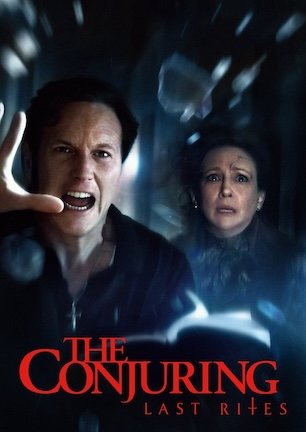Studio: Blumhouse/Momentum
Director: Rob Savage
Writer: Gemma Hurley, Rob Savage, Jed Shepherd
Producer: Jason Blum, Douglas Cox, Rob Savage
Stars: Annie Hardy, Amar Chadha-Patel, Angela Enahoro
Review Score:
Summary:
An abrasive internet personality encounters a night of supernatural terror as she livestreams her attempt to escort a mysterious, elderly woman.
Review:
Director Rob Savage rocketed out of left field to become an indie horror darling in 2020 with his breakout hit “Host” (review here), which he co-wrote with creative collaborators Gemma Hurley and Jed Shepherd. The movie, about a group of friends who conduct a séance over Zoom during the COVID-19 pandemic, was the perfect panacea for starving fright film fans who’d been suffering an entertainment famine while going stir crazy due to the lockdown. “Host” tapped a timely vein by capitalizing on the current climate and technological trends, and audiences stuck at home ate it up. The boon for Savage was everyone immediately wanted to be in business with him, and he brokered a three-picture deal with Blumhouse out of the hubbub.
When his follow-up screenlife film “Dashcam” debuted to similar raves at TIFF in 2021, it looked like Savage’s jar had captured a second strike of lightning. Word of mouth was initially ecstatic about Annie Hardy’s kooky performance. In “Dashcam,” Hardy plays herself as an amplified anti-vax anarchist who livestreams the comedic chaos of disobeying mask mandates, peddling COVID conspiracy theories, and wearing a red MAGA cap to additionally ensure every irritated person she annoys is as childishly provoked as possible. Her deliberately offensive antics create an offbeat protagonist who kind of gets a comeuppance when she accepts an offer to escort an old woman and enters an evening of escalating supernatural havoc. Early audiences thought the whole setup and execution made for an inventively wild ride that was wickedly irreverent to boot.
That buzz fizzled into regretful murmurs when some who’d applauded “Dashcam” discovered tweets suggesting Annie Hardy’s onscreen incarnation might not be an exaggerated alter ego after all. Hardy’s social media accounts were peppered with posts equating masks in schools to “child abuse,” claiming the vaccine was made with HIV, and implying that the PCR inventor may have been assassinated after supposedly confessing his tests don’t work for COVID. Cringing at the possibility that Hardy could in fact be an actual crackpot, disappointed “Dashcam” cheerleaders put down their pom-poms and stopped promoting the film any further.
Savage did himself no favors by going to bat for his star. He posted a defense that said, “Annie is more than her craziest tweet,” and added, “Annie has battled addiction and experienced trauma & loss on a level unimaginable to most of us.” Some folks were understandably unimpressed with this as an apparent excuse for irresponsible behavior. By association, Savage took a fast track from underground horror hero to potentially poisoned person while “Dashcam’s” seemingly goofy gimmick suddenly looked a lot less fun.
Let “Dashcam’s” offscreen drama be a cautionary tale. If you believe wild sh*t, consider keeping it to yourself. Unless you want people to worry about the possible stigma of working with you, spreading dangerous disinformation or sticking up for someone who does is a speedy way to sabotage a career with only two or three lines of text.
I would have preferred not to recount any of this, except the fact of the matter is, how you take to “Dashcam” is inseparably dependent on how you take to Annie Hardy, either the character or the person or both, I don’t really know if there’s much difference between the two. Using the blunt force of a spiked baseball bat to the face, the movie establishes Annie with nearly 17 minutes of nothing but shtick. Some of her juvenile nonsense is funny, like the scene where she surprises her old friend Stretch with a “Silverlake handshake” (I live in Silverlake and have never heard of this) and his bedroom spontaneously bursts into bedlam. Other intended laughs are entirely tied to how closely you synch with Annie’s rude, crude sense of humor. If you’re already a “truther,” the two of you will be peas in a pod. If you can see her as a self-effacing spoof of a QAnon weirdo, she should satisfy you as satire. But if you’re immediately put off by Annie’s unapologetically abrasive attitude, you’re in for a long haul of attempted jokes about AIDS and anal prolapses, and a whole lot of improvised song lyrics about incest and ejaculations.
You’ll also have a hard time with “Dashcam” if you’re intent on a substantial story with explanatory lore to back up the paranormal part of its premise. Once Annie’s outing turns into a nearly nonstop nightmare of savage supernatural slaughter, “Dashcam” dispenses with proper plotting for a second half that consists almost entirely of nothing but jump scares.
The thing is, a majority of “Dashcam’s” audiovisual spooks are undeniably effective despite their overreliance on timing and showmanship. When you can see what’s going on, that is. More than a few times, the camera is so shaky and the picture quality is so poor, it’s impossible to know who or what you’re looking at. When you can see them though, the scares are energetic, violent, and highly capable of instantly elevating susceptible heart rates. In fact, it can easily be argued that “Dashcam” gets too showy with cleverly designed crashes, carefully choreographed smashes, and stunts staged for maximum audience reactions. The movie maintains such a breakneck pace of constant action in the last act that shocks stop being shocking and just become normal beats.
“Dashcam” definitely qualifies as a “your mileage may vary” movie. Even though it only follows a simple ping-ponging ball of Annie basically bouncing from car to car, escape to escape, and attack to attack, “Dashcam” delivers an enjoyable sensory experience well stocked with spills, chills, and thrills. Whether or not that’s what you want out of this frenetic film, there’s still the matter of the leading lady too, and whether or not you can disassociate her persona from cuckoo craziness. Looking at the glass as half full, at least Annie exhibits a personality when 95% of “found footage” characters don’t display any distinguishable traits at all. But while I personally don’t think “Dashcam” puts her problematic politics in a positive light, I can certainly understand someone being disgusted with “Dashcam” regardless.
Review Score: 65






Although it leaps off a compelling springboard, “The Carpenter’s Son” lands in a shallow pool in search of more commanding material.